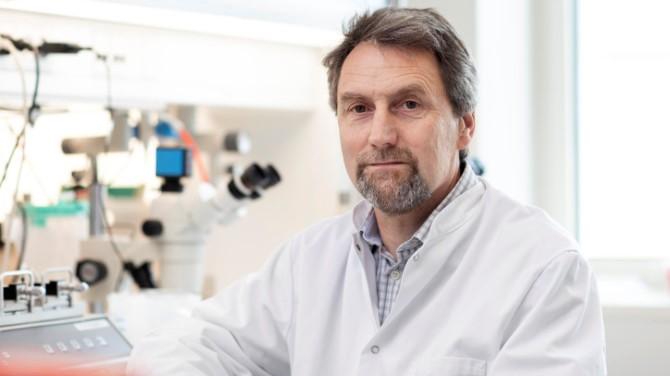With a grant of just over DKK 5 million, Professor and DMSc Ulf Simonsen from Aarhus University is immediately beginning a research project with the aim of treating patients with the corona virus and reducing the need for ventilators

Credit: Lars Kruse, Aahus University Photo
Professor, DMSc, Ulf Simonsen from Aarhus University, Denmark, knew that he and his research group had made an important discovery a few years ago, when they discovered that it was possible to inhibit the development of severe acute respiratory syndrome and damage to the lungs by blocking a potassium channel in the lungs with the drug Senicapoc. So important that he and his research colleagues together with Aarhus University patented the discovery. But at the time, he had no idea that the discovery could be of crucial importance to people infected with the corona virus, as the first pandemic of modern times spread around the world.
“We’ve discovered that by using Senicapoc, we can block the ion channel that sits in the cells between the lung’s alveoli cavities and the blood – what we call the pulmonary barrier. By doing this, we don’t treat the viral infection, but we prevent or slow the development of the disease that in turn leads to severe damage to the lungs,” explains Ulf Simonsen.
In the research project for which Ulf Simonsen has now received funding, he and his colleagues will investigate whether the treatment with Senicapoc is able to reduce the amount of time spent on a ventilator during the course of the COVID infection. In other words, whether treatment with the drug can prevent the emergence of severe acute respiratory syndrome and lung damage in a way that reduces the need for a patient to be on a ventilator.
When a person is infected with COVID19, the worst case scenario is that they will suffer severe lung disease. Water in the lungs is a critical sign of this, and many patients die due to this condition, because their level of oxygen saturation falls and they suffer difficulty breathing.
“This is the situation where the need for treatment with a ventilator occurs, and it’s also here that we hope the Senicapoc treatment can make a difference – if only so that the patients require a shorter period on a ventilator,” says Ulf Simonsen.
The effect can be assessed within the next two months
The treatment will already begin within a few weeks at Aarhus University Hospital, Odense University Hospital and Hvidovre Hospital, where selected patients admitted with COVID-19 will be offered the chance to participate in the research project and receive treatment with Senicapoc.
Treatment with the new drug begins in connection with the patients’ transfer from one of the infectious diseases departments to intensive care. Ulf Simonsen believes that the project group will be able to assess whether the new treatment has reduced the number of days on the ventilator relatively quickly.
“The results still depend on how quickly we can obtain and analyse data. We won’t have a complete picture immediately, but I expect that we’ll be able to say whether the medicinal treatment reduces the need for ventilators within the next two months,” says Ulf Simonsen.
“Everything is a little chaotic right now. We need to get all the practical aspects in place so we can already begin in April, when the disease is expected to peak in Denmark. We had planned a similar project, but now everything has to move really fast, and that demands everyone involved makes an extra effort – not least my clinical colleagues who are already busy at the hospitals,” he says.
Ulf Simonsen receives a total of DKK 5.3 million for the treatment and prevention of severe pulmonary manifestations – as the professionals call it – by COVID-19 with Senicapoc (COVIPOC).
His research project is one of a total of nine research projects sharing the DKK 50 million that the Danish government has earmarked for corona-related research. The projects intend to quickly obtain new knowledge and new solutions in the fight against COVID-19, and they are being launched immediately, so that the results can benefit the public, the healthcare sector and society in general as quickly as possible.
###
The press release is partly based on information from the Danish Ministry of Higher Education and Science.
Media Contact
Professor Ulf Simonsen, DMSc
[email protected]
0045-60-20-26-13
Original Source
https:/




